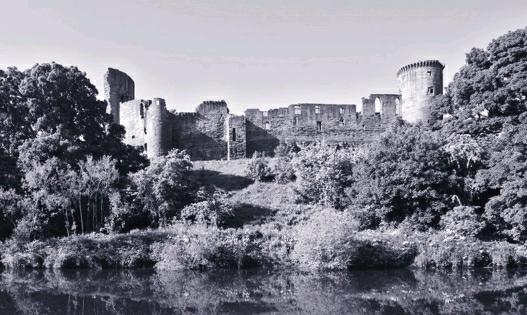摘水果的希望
2018-01-04ByChristineMcCafferty
By+Christine+Mc+Cafferty
由于發现了Ian的秘密赌局,Shannon开始疏远他并心生戒备。可迫于囊中羞涩,她们只得搭Ian的车赶往附近的一个农场,据说那里可以找到摘水果的工作。就在两人兴奋不已地盘算着能好好挣上一笔、尽快摆脱Ian的时候,希望再次破灭了。原来到了农场一打听,才知水果成熟还得几个月呢,可这燃眉之急如何能解……
Shannon had upset Ian or Ian had upset Shannon… or probably both. But basically Shannon had turned down his attempt to get her into his bedroom for the night. And rightly so! Also, Shannon and Christine had spent way too much money to sleep one night in a B&B1. The girls were feeling uncomfortable with Ian, and were deeply aware of their need to start making money as soon as possible.
Relying on other people was so tricky2 and it was not for lack of trying to find a job. Shannon and I had done everything we could to find work. This was not the situation we had hoped to be in. Over breakfast, Shannon told Ian and me about her conversation with the B&B owner the night before. The owner had told her about jobs available on a farm nearby, picking fruit. Shannon told Ian confidently that he could simply drive us to the farm and leave us there. How awesome3! Before long we would be picking strawberries, eating many no doubt, and being paid for exercising out in the fresh air. Just imagine, wed be making our own money!
So we got in the car ready to go. The town of Blairgowrie4 is an interesting place. What I loved about travelling in England is that you get snapshots5 of history wherever you go.
As we drove through Blairgowrie, along the riverside, travelling in the direction of the farm, we went past some very large old brick buildings. These, long ago, had been mills6. One of them, Keithbank Mill, has since been converted into luxury apartments. What was their history?
Centuries ago in Blairgowrie, like in many places in Scotland, people grew some flax alongside their oats crops on their own little plot of land.7 The oats was used to make the lovely hot porridge that is so famous there. Flax is one of the oldest cultivated plants in human history, and can grow well in colder climates like Scotlands. Inside the flax stem are long fibres8. These fibres were hand spun9, on a spinning wheel, into thread. The thread was then woven on a handloom10 to form cloth. The cloth made from flax is called linen11, the same word that we use today for towels and sheets, so you can see what it was mostly used for. This was how people made cloth, usually for their own families, working from home, for thousands of years.
That was until the invention of more sophisticated machines such as framework knitting machines12. These allowed workers to produce cloth about 100 times faster than before. They still only used human power. However, the next important invention was the mill. Towns along rivers, like Blairgowrie, grew because people could use the power of the running water to turn wheels which turned the machines that produced the cloth. People, including many women and children, as they could be paid less, worked in large factories outside of the home.
Blairgowrie grew from about 400 people in the 1700s to 4,000 by the late 1800s. There were 12 mills along the River Ericht13 by 1870. Today all of them are shut and only a few of the huge, old buildings remain. A couple are museums that you can visit. Most of the cloth and textiles produced today come from China, and are shipped into Europe.
But we did not have time that day to explore this important part of our history and heritage14. We were headed straight to our new jobs. An industry that is still important in Europe is producing food. Food is best when it is fresh and clean, and Europeans still prefer and trust their own local foods most. Blairgowrie has a strong industry producing soft fruit such as raspberries, strawberries, blueberries, currants, aronia, cherries and gooseberries.15 These are sent to markets and factories around the United Kingdom and, in fact, the world. This industry developed in the 1900s, perhaps to replace the dying textiles industry. A company named Smedleys opened a fruit cannery16 and Adamsons a jam factory.
Picking soft fruit has to be done by hand and so berry pickers are needed, and this is where we would fit in! We pulled up at West Haugh Farm hopeful of finding our place among the hundreds of bustling workers heading out early each morning and sometimes working late in the evening to pick the fruit and pack it.17
The place seemed awfully quiet. Not much going on. Well, we thought, maybe they were all out in the fields or the long tunnels.
“Ian, you can drop us here,” said Shannon, “Well be fine. Well be signed up by the end of the day and well stay here too, from tonight.”
Shannon looked him in the eye, proudly and independently.
“Thats great but Id rather wait till its a done deal. I dont want you sleeping on the street,” he said.
“Well you wouldnt care. Unless, of course, you want me in your bed instead,” she said, and looked away.
He looked at her thoughtfully. “Maybe I do care,” he said. Shannon said nothing. “Look, last time I left you in Scotland, it was outside an Italian restaurant, and you ended up jobless and being harassed18 by old Italian men. Come now. Go talk to them. Ill wait here for you, just in case.”
“Youre wasting your time,” she said, “but suit yourself19.”
I gave him a pretend puzzled and sympathetic look. I felt a little embarrassed for him. But I would soon be feeling more embarrassed for ourselves.

We were greeted by a friendly farm manager as we approached what looked like an office and reception area. We flashed20 him our brightest smiles. “New workers reporting for duty21,” I said in an expectant voice.
“Young lassies,” he said, with a strong Scottish accent, “Yes, were signing up ‘wirkers right now.22 We are going to have a busy season. A lot o orders and the weather is expected to be right, just as it was last year, to give us a good crop23. Just in time you are as we like all our workers to be booked by the end of April, and we still have some places to fill. Its ‘solid24 wirk though. Are you sure that youre up to it? You have to work the whole season; at least five days a week; sometimes six at busy times.”
“No problem. Work has never scared us and we need the money too,”Shannon said.
I asked, “Can we stay from tonight? Were kind of in a difficult situation.”
“Tonight? No lassies,” he laughed. “We have all the crops growing in the fields already, so no work there, and you wouldnt think that in this icy cold weather wed have berries ripening! Were still months from picking. Its barely past Easter25, and harvest is at the end of summer. Surely you know? Some picking starts in July, if we have a good hot summer, but the bulk26 is done from August to the end of October. We have some forms to fill out and I can see you back then.”
Our hearts sunk. We looked at each other. Not wanting to seem like fools, we put on brave faces. We filled out and signed many pages of paperwork and said wed be back, though I did wonder about that. So we never used the word “promise”.
We walked back to Ian. He was waiting at the car. He didnt say a word. He didnt need to. He drove off and we were quiet.“Come on now,” he said, “Ill take you to the city of Stirling27. Thats where Im headed next. Youll enjoy it.”
Once the capital of Scotland, Stirling is dominated by Stirling Castle which was home to many Scottish kings, including James VI. He would later unify Scotland and England as the king of both, and Stirling Castle was a symbol of the wealth and riches of both kingdoms. Christine and Shannon were desperate to see this grand palace and fortress(城堡,堡垒), but how would they afford to get in?
1. B&B: 含早餐旅馆(bed and breakfast)。
2. tricky: 棘手的,困难重重的。
3. awesome: 好极了。
4. Blairgowrie: 布莱尔高里镇,位于苏格兰中部的珀斯郡。
5. snapshot: 大致印象,点滴见解。
6. mill: 制造厂,工厂。
7. flax: 亚麻;oat crop: 燕麦作物;plot: 小块土地。
8. fibre: 纤维,丝。
9. spun: spin的过去分词,spin是纺纱、纺线的意思。
10. handloom: 手织机。
11. linen: 亚麻布,也有家庭日用织品(如床单、桌布等)的意思。
12. framework knitting machine:纬编织机,针织机。
13. River Ericht: 埃里赫特河,位于英格兰珀斯郡。
14. heritage: 遗产。
15. soft fruit: 无核小果;raspberry:覆盆子,山莓;currant: 无核小葡萄干,加仑子;aronia: 野樱莓;gooseberry: 醋栗,鹅莓。
16. cannery: 罐头食品厂。
17. pull up: 停车;bustling: 繁忙的,喧闹的。
18. harass: // 骚扰。
19. suit yourself: 隨你的便。
20. flash: 闪现,迅速亮出。
21. report for duty: 报到。
22. lassie:〈口〉小姑娘;sigh up:签约雇用。
23. a good crop: 好收成。
24. solid: 不中断的,连续的。
25. Easter:(基督教)复活节(纪念“耶稣复活”的节日,一般指每年过春分月圆后的第一个星期日)。
26. the bulk (of sth.): 大部分,多半。
27. Stirling: 斯特灵,苏格兰中部城市,曾是苏格兰王国的首都与政治、商业与工业中心。
